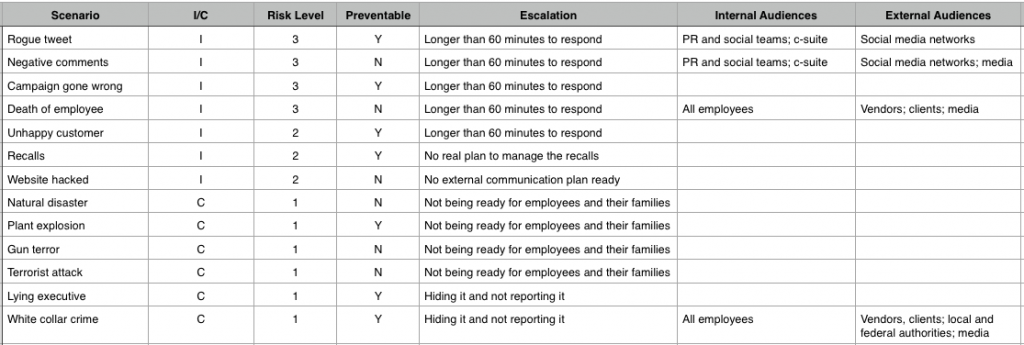What a whirlwind last week was at Social Media Marketing World!
As part of a beta test, I worked with Phil Mershon and Michael Stelzner to schedule meetings with organizations that need help with crisis communications and those went really well!
We talked about everything from negative reviews and snarky emails to tax evasion and Hurricane Katrina.
Some of what we discussed could have been completely avoided while others were a major slap in the face of the unprepared.
The one thing everyone had in common, though? During the crisis communications, they got defensive and flustered instead of remaining cool and collected.
Which comes down to one thing: Preparation.
If you are not prepared to handle a negative tweet, a rogue employee, a natural disaster, or even gun terror, you will not handle it well.
Issue vs. Crisis
So the first thing we did is talk through the difference between an issue and a crisis.
An issue:
- Is not harmful to an organization’s reputation;
- Does not affect the bottom line;
- Can almost always be avoided;
- Can escalate into a crisis, if not handled immediately; and
- Is a blip in the 24/7 news cycle.
A crisis, on the other hand:
- Has long-term repercussion on an organization’s reputation;
- Generates a loss of money…generally lots of it; and
- Can always be avoided.
Most of us face issues every day…they are things that can be avoided and can be managed fairly efficiently and easily.
When they escalate into crises, though, is when we let the events get the better of us.
The Crisis Communications Process
Then I walked them through a six-step crisis communications process to prepare for every situation:
- Brainstorm every possible scenario that could happen to your organization. Include things such as campaigns gone wrong (see the Sea World campaign that happened just last week) and terrorist attacks. Include things your executive team could do, including sexual harassment and tax evasion. Bring in people from different departments and have them get as morbid as they can. If you can imagine it, it’s possible it will happen.
- Decide if it’s an issue or a crisis. Use the bullet points above to help you put an I or a C in the column next to the scenario in a spreadsheet.
- Determine the risk level. If it’s a 3, it’s pretty low-risk and not very scary. If it’s a 1, you’d better be prepared not to sleep for a few days.
- Is it preventable? Now add whether it’s preventable or not. In some cases, you can’t prevent an unhappy customer or product recalls, but you can prevent a campaign gone wrong or a lying executive (maybe).
- What will escalate it? Now you need to determine what will take it from an issue to a crisis and what will take it from a 3 to a 2 to a 1.
- Who are your audiences? The last thing you add to your spreadsheet is who you need to communicate to, internally and externally. For a negative comment on your Facebook page, not everyone in the organization needs to know, nor do you need to call a news conference. But if you have an executive who is about to be indicted, pretty much everyone needs to know. Get out in front of every story with the appropriate audiences.
Your spreadsheet can be as simple as the example. It will by fluid and you will add to it constantly. But this will help you be prepared and keep a calm and collected head.
Get ‘Er Done!
There is a lot more to crisis communications planning, of course, but following these steps will give you a really good start.
I know what you’re thinking, “I don’t have time to do this right now, but I’ll get to it soon.”
Don’t get to it soon. Having even a simple spreadsheet like the one above will force you to think about how to handle yourself when something goes wrong.
If you wait, you’ll be in the middle of it and curse yourself because you’re about to lose your head (and then you can hear me saying, “I told you so!” in the back of your brain).
Thinking through a crisis communications plan like this is like having really good insurance: The moment you let it lapse, Murphy and his Law take effect.
photo credit: Shutterstock

